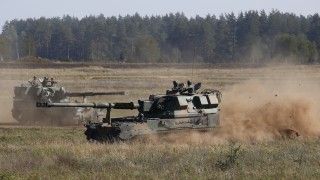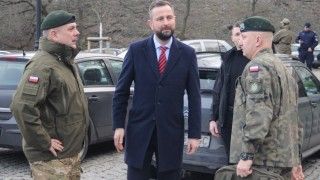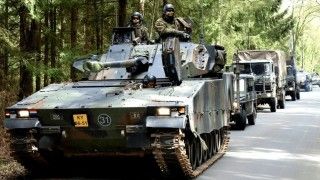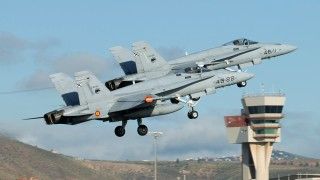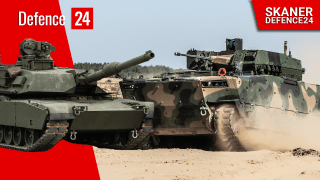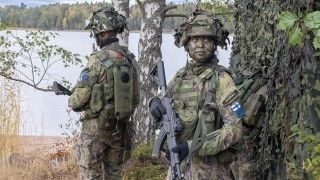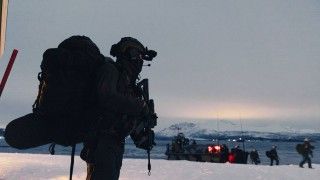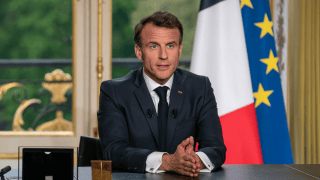- WIADOMOŚCI
- KOMENTARZ
- OPINIA
- ANALIZA
2024: no credit holidays from strengthening European security
We live on the European continent, which, like never before in the 21st century, requires us to reflect on security and defense issues. But not emotional, momentary unity in the face of Russian aggression against Ukraine, but the long-term building of our shield and sword, without which we will be unable to continue other necessary transformations of our economic, ecological, social, and technological space in the coming years.
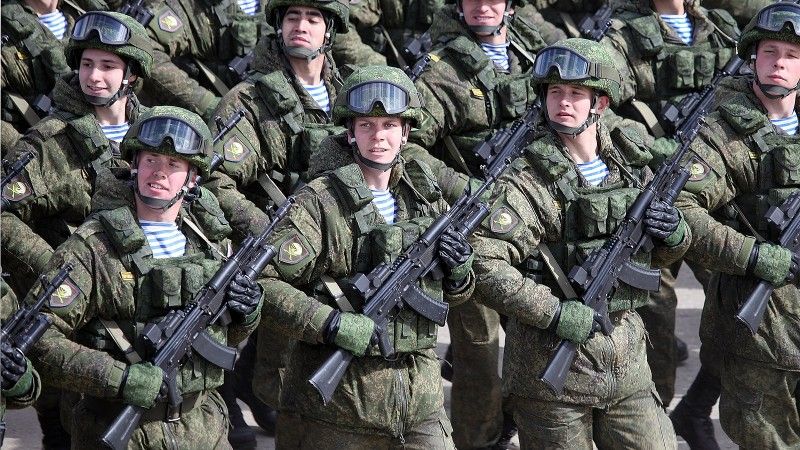
Photo. Vitaly V. Kuzmin/Wikipedia/CC4.0
For William Clinton, James Carville coined the phrase „The economy, stupid, „which was supposed to reflect the new approach to the post-Cold War years. Especially in Europe today, we need to promote the new phrase - „defense, stupid.” Especially since Russia already thinks with entirely different standards and intends to keep it the same in the coming years. Therefore, the picture of the upcoming 2024 is bleak.
So far, the post-Cold War „green island” of stabilization, in the form of the European continent, is increasingly plagued by questions about the possibility of a conventional war. Many military commanders, both serving and retired, draw attention to this fact. But similar voices also regularly appear in the debate of civilian experts and analysts dealing with security and defense issues. Of course, this is the result of observing the repercussions of Russian aggression against Ukraine and the Kremlin regime pushing further limits on the use of force, and not only the military one. In no case does Russian policy indicate the will to withdraw from further escalation of violence on the front line, but also towards the entire Ukrainian territory. A particular lesson of this brutal truth was the massive attack on Ukrainian cities almost in the last days of 2023 and on New Year’s Day.
The authorities in the Kremlin have smelled the proverbial blood and will be aggressive in 2024
Unfortunately, the Putin regime sensed its opportunity for strategic victory with the failure of the 2023 Ukrainian offensive and possible problems with military aid from the West. Therefore, we can most likely expect attempts to change the military and political situation in general in the coming year. It is not without reason that the Ukrainian side is constantly not only fortifying the active front line but also trying to take actions to secure, for example, the border with Belarus.
It implies concerns about the escalation and increase of problems relating to regional security, which we had a foretaste of in the last days of 2023 in Poland due to the appearance of an unidentified missile over our territory. Equally, 2024 will be the period of testing our flank capabilities in terms of military and political response on a similar or larger scale regarding Russian missiles or unmanned aerial vehicles—noting that this concerns Poland and Romania. These two countries are strategically crucial for maintaining military assistance to Ukraine, on whatever scale it may be in the next twelve months. If the Russians do not have to worry about their positions in the occupied territories, we should not expect that they will also forget about the importance of the channels through which military aid is provided (in both directions because some of the Ukrainian equipment is and will be serviced and repaired in other European countries ).
The passing year forces us to reflect that such challenges to our security do not concern only the military means of the Russian side. We must constantly remind ourselves that Russia is a rogue state in terms of using its intelligence tools as part of secret operations. Of course, when we look at the most significant armed conflict after 1945 in Europe, we may miss the scale of direct threats from the SVR, FSB, GRU/GU trio. From constant pressure, even aggression in the cyber domain, through attempts to eliminate personal targets (dissidents, arms dealers, etc.), to sabotage military industry and critical infrastructure, of course, the use of migration pressure, and ending with the direct use of chemical weapons, poisons, and radioactive materials.
Russia has been violating security standards in Europe for years, and the coming months will be no exception to the rule
We must realize that everything mentioned above applies to Europe before 2022 and to all of us here and now. Just look at the fragmentary information coming from Poland regarding the dismantling of a group of Russian agents-saboteurs who were potentially targeting transport routes. One may get the impression that it is them, and not even the conventional cruise missile, that should change our approach to assessing Russia’s aggressiveness.
The Kremlin is not afraid of using violence, even against targets on the territory of NATO and EU countries, knowing that, for example, blowing up a train could result in the death of citizens of other countries. But there should be no illusions in this regard, bearing in mind Russia’s responsibility for shooting down the MH-17 civilian passenger plane and in conditions before the full-scale aggression of 2022. To put it bluntly, the Kremlin is not only attacking Ukraine but is also doing so against other countries. Therefore, we enter 2024 not only as passive observers of Ukraine’s defense struggles but also as countries threatened here and now by the Russians.
Especially since, in the case of Russia, the most significant changes are unfortunately taking place behind the front, where, regardless of the cutting efficiency, the Russian authorities are switching to a multi-year military effort. Remembering that the same Putin’s Russia, even before the 2022 aggression, was carrying out changes in the scale of the country’s resilience exercises, often incomprehensible in the West at the time. From maneuvers militarizing all aspects of the economy and financial system to strengthening civil defense or, more broadly, militarizing the already highly militarized Ministry of Emergency Situations (EMERCOM).
Today, facing 2024, we should look at the armed forces and other aspects of the Russian state that were included in the armament effort. For example, when we see any disturbances in the field of fires in Russia and other events of this type, assuming the possibility of sabotage by Ukraine fighting against Russian aggression, we must remember the role of the mentioned EMRCOM. However, due to Ukraine’s lack of operational capabilities (long-range missiles, etc.), the most outstanding effort involves restoring offensive capabilities in Russia. Let us emphasize offensive, not defensive, because, in the case of Russia and its strategy during the Putin era, it is rather challenging to say that this country ever focused on strictly defensive needs (for instance, most of the scenarios from a series of Zapad military exercises were offensive). Again, let us remember that only the Kremlin’s propaganda mouthpieces seem to accept narratives about „provoked” actions, „counteracting NATO aggression,” and a similar gibberish format of Russian propaganda.
Our rationality versus Russian realities, or not making the mistakes of the past
Russia’s restoration of war capabilities includes the mobilization of new soldiers, changes (at least attempts to change them) in their equipment, and reaching for quantitative resources in the case of equipment and weapons. Moreover, there can be no doubt - based on the experiences of 2023 - that the Russian side will try to maintain the possibility of eliminating Ukrainian advantages in the technological sphere. Some of them (such as introducing new human resources directly to the front lines without adequate preparation) may be incomprehensible from a Western perspective but may, unfortunately, be effective. In this case, an important aspect that determines pessimism in assessing the level of security in Europe is the lack of a radical decline in Russian society in the face of growing war losses. Significant, regardless of whether we accept Ukrainian statistics or more cautious estimates from Western intelligence services. The conventional tandem of poverty and propaganda, mixed with neo-imperial visions, gives the Kremlin authorities a window to recruit into the army. Especially when the terrified cities of 2022 are left in peace (at least on a scale that does not threaten to create a critical mass) so that they can have fun in the most expensive discos or create substitutes for everyday life.
But at the same time, it must be clearly stated that the aggression against Ukraine went from being a conventional propaganda „Special Operation” (as the Russians call full-scale aggression against Ukraine), which was a whim of the ruling elites and became a war of the Russians, who actively or tacitly took responsibility for it. Therefore, it is a great mistake to duplicate the standards of assessing Russia using Western rationality, inherent in conditioning some aspects of decision-making processes based on respect for the individual, democracy, democratic standards, or even a free market economy. It makes us even more vigilant towards 2024 and Russian actions in various directions. Let us note that the Russians have not only broken all standards of international law but are also „working” regularly to reduce the existing confidence-building measures (if any still exist). In the absence of transparency and with a significant mobilization of forces and resources, ideologization of the Russian political debate on a scale already reminiscent of Soviet standards, it is possible to make a mistake in assessment or deliberately try to go one step further in aggression. And this is not about undermining the strategic goal of Russian policy, which is neo-imperialism. Instead, it is about making mistakes in intelligence and political assessments regarding specific strategic and operational activities.
Every scenario for developing the European security situation can be considered realistic in 2024
To put it bluntly, Russia is not in such a dire situation that one can think of its sudden collapse, but at the same time, it knows that its window of opportunity for action in Europe is ending. Of course, this is about long-term repercussions on our economy, demography, and development of military technologies, but also the processes of strengthening NATO and the West. Therefore, we can expect everything from the Russian side, especially regarding the security of the Eastern Flank, and it should not be treated as building a narrative intended to intimidate society. These diagnoses should be positioned as laying the foundations for future effective deterrence.
Because it is in Europe that we still struggle the most (on different scales, in different countries) with three key challenges related to our security and defense area, these are quantitative issues in terms of armed forces (in peacetime and wartime, especially reserves), material and industrial space (in peacetime and wartime, especially reserves of ammunition, spare parts, and weapons) and, above all, the location of societies about their resilience (especially understanding the necessity of having our national models of total defense, including more robust civil defense).
Without stating that we are not a „green security island,” it is difficult to create a space for debate on financial burdens, the requirement for training of societies (military and non-military), changes in the approach to production in the military industry (compared to the standards forged in the post-Cold War period) and, above all, maintaining significant armed forces. One may fear that today’s specialist discussions relating to specific time perspectives (2-3 years, 2-5 years, etc.) regarding the Russian threat are an attempt to approach this issue delicately. So as not to cause psychologically solid pressure on European societies.
But at the same time, seeing 2024, we can appeal not to let the vision of „a problem long ignored solve itself” become the rule of European countries. We must start solving it with courage in the next twelve months. Nothing ensures peace, even in Europe, in 2024, such as increasing ammunition production processes, large-scale military maneuvers, investments in intelligence and counterintelligence services, and the development of future military technologies. And nothing provides a better deterrent to Russians against their aggression than the vision of solid alliance ties based on the ability to deploy the first line and the necessary reserves. Similarly, we must once again overcome doubts regarding nuclear deterrence. We need to be more embedded in allied relations than in previous years, but this will take work due to the attitude of the authorities, e.g., Hungary. At the same time, questions about the US attitude towards Europe in the following election months. However, it is still up to us Europeans how we will meet the challenges for our security and approach complex issues.
The time of thoughtless denial of reality is ending before our eyes
The time of a thoughtless approach to military threats is forever gone, regardless of our methods of assessing Russia. It must be recognized now that to avoid using defense, the Russians must be deterred or, as Lord Ismay (the famous Secretary General of NATO during the Cold War) said, kept away. However, this task will not be impossible if, in 2024, we decide that the war is no longer a „hot topic” and we manage to displace it. It is not about fear but about self-confidence that European countries will be able to cope with the conditions of various forms of Russian aggressive policy. Not to mention the most problematic issue, namely aid to Ukraine.
If Ukraine fails in 2024 or an agreement with Russia will be imposed on this country’s authorities, the clock of Russia’s aggressiveness will only accelerate. However, it is difficult to assume that the Kremlin’s will to win would be flexible enough to accept something like the rotten solutions of the subsequent „Minsk agreements” (freezing the aggression against Ukraine from 2014-15 and sanctioning the then occupation of part of the territory of this country). In any case, also in the case of aid to Ukraine, Europe has more to do today in 2024, and this refers to taking greater responsibility for training processes (maintaining funding, potentially scaling up if Ukraine decides to mobilize more extensively) and material assistance. Regardless of the electoral processes in the USA, the countries of the European continent must invest in autonomy to act without, of course, assuming the collapse of transatlantic ties.
Repayment time for a loan taken out during the so-called peace dividend has come now, and we cannot count on another credit holiday from the world. Even not only in Russia, we are observing equally dangerous trends in Europe in the Middle East and sea routes, as well as instability (military coups, wars, and internal conflicts) on the critical African continent. We are also, whether we like it or not, dependent on the stability of the Indo-Pacific and the Arctic. In addition, we must recognize that in Europe, we still have a lot to do in terms of counteracting crises in disputed areas - Kosovo, Bosnia and Herzegovina, Serbia, Greek-Turkish relations, or the eastern part of the Mediterranean in general without denying other needs, because terrorist threats are something that still exists and will continue to exist. All this requires an appropriate base of aid and educational programs, economic strength, etc., and direct military resources on the European side. The French want to call it strategic autonomy, but the author of this commentary is more focused on strategic independence, and it may be about common European security.













